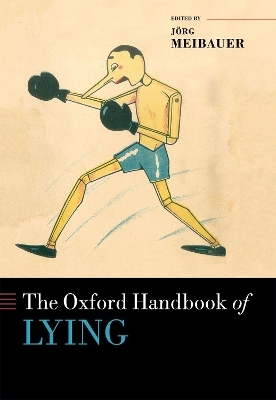
The Oxford Handbook of Lying
Oxford University Press (Verlag)
978-0-19-873657-8 (ISBN)
This handbook brings together past and current research on all aspects of lying and deception, with chapters contributed by leading international experts in the field. We are confronted daily with cases of lying, deception, bullshitting, and 'fake news', making it imperative to understand how lying works, how it can be defined, and whether it can be detected. A further important issue is whether lying should always be considered a bad thing or if, in some cases, it is simply a useful instrument of human cognition. This volume is the first to offer a comprehensive and up-to-date exploration of these and other issues from the combined perspectives of linguistics, philosophy, and psychology. Chapters offer precise definitions of lying and its subtypes, and outline the range of fields in which lying and deception play a role, from empirical lie detection and the acquisition of lying to its role in fiction, metaphor, and humour. They also describe the tools and approaches that are used by scholars researching lying and deception, such as questionnaire studies, EEG, neuroimaging, and the polygraph.
The volume will be an essential reference for students and researchers in a range of fields who are looking to deepen their understanding of all aspects of lying and deception, and will contribute to establishing the vibrant new field of interdisciplinary lying research.
Jörg Meibauer is Professor of German Language and Linguistics at Johannes Gutenberg University Mainz. His research focuses on cognitive pragmatics, with an emphasis on the grammar-pragmatics interface. His many publications include Lying at the Semantics-Pragmatics Interface (De Gruyter Mouton 2014) and he is the editor of multiple volumes such as What is a Context? Linguistic Approaches and Challenges (with R. Finkbeiner and P. B. Schumacher; Benjamins 2012) and Pejoration (with R. Finkbeiner; Benjamins 2016).
1: Jörg Meibauer: Introduction: What is lying?
Part I: Traditions
2: James Edwin Mahon: Classic philosophical approaches to lying and deception
3: James Edwin Mahon: Contemporary approaches to the philosophy of lying
4: Karol J. Hardin: Linguistic approaches to lying and deception
5: Lewis Bott and Emma Williams: Psycholinguistic approaches to lying and deception
6: Alexa Decker, Amanda Disney, Brianna D'Elia, and Julian Paul Keenan: Lying, deception, and the brain
Part II: Concepts
7: Stephen Wright: Lying and truth
8: Mark Jary: Lying and assertion
9: Matthew Benton: Lying, belief, and knowledge
10: Andreas Stokke: Lying, sincerity, and quality
11: Swati Gupta and Andrew Ortony: Lying and deception
12: Neri Marsili: Lying and certainty
13: Don Fallis: Lying and omissions
14: Jörg Meibauer: Lying, implicating, and presupposing
15: Kathi Beier: Lying and self-deception
16: Eliot Michaelson: Lying, testimony, and epistemic vigilance
Part III: Types of lies and deception
17: Julia Staffel: Knowledge lies and group lies
18: Jennifer Lackey: Selfless assertions
19: Jörg Meibauer: Bald-faced lies
20: Andreas Stokke: Bullshitting
21: Jennifer Perillo: Bluffing
22: Simone Dietz: White and prosocial lies
Part IV: Distinctions
23: Emar Maier: Lying and fiction
24: Matthew McGlone and Max Baryshevtsev: Lying and quotation
25: Marta Dynel: Lying and humour
26: Rachel Giora: Lying, irony, and default interpretation
27: Paul Egré and Benjamin Icard: Lying and vagueness
28: Claudia Claridge: Lying, metaphor, and hyperbole
29: Marina Terkourafi: Lying and politeness
Part V: Domains
30: Victoria Talwar: Development of lying and cognitive abilities
31: Samantha Mann: Lying and lie detection
32: Kees van Deemter and Ehud Reiter: Lying and computational linguistics
33: Bella M. DePaulo: Lying in social psychology
34: Matthias Gamer and Kristina Suchotzki: Lying and psychology
35: Giorgio Ganis: Lying and neuroscience
36: Thomas L. Carson: Lying and ethics
37: Stuart P. Green: Lying and the law
38: Marta Serra-Garcia: Lying in economy
39: Anita E. Kelly: Lying and education
40: Dariusz Galasiński: Lying and discourse analysis
41: Piers Robinson, David Miller, Eric Herring, and Vian Bakir: Lying and politics
42: Thomas L. Carson: Lying and history
43: Bettina Kümmerling-Meibauer: Lying and the arts
44: Fumiko Nishimura: Lying in different cultures
| Erscheinungsdatum | 26.11.2018 |
|---|---|
| Reihe/Serie | Oxford Handbooks |
| Verlagsort | Oxford |
| Sprache | englisch |
| Maße | 171 x 246 mm |
| Gewicht | 1340 g |
| Themenwelt | Geisteswissenschaften ► Philosophie ► Erkenntnistheorie / Wissenschaftstheorie |
| Geisteswissenschaften ► Philosophie ► Ethik | |
| Geisteswissenschaften ► Philosophie ► Sprachphilosophie | |
| Geisteswissenschaften ► Psychologie ► Verhaltenstherapie | |
| Geisteswissenschaften ► Sprach- / Literaturwissenschaft ► Sprachwissenschaft | |
| ISBN-10 | 0-19-873657-6 / 0198736576 |
| ISBN-13 | 978-0-19-873657-8 / 9780198736578 |
| Zustand | Neuware |
| Informationen gemäß Produktsicherheitsverordnung (GPSR) | |
| Haben Sie eine Frage zum Produkt? |
aus dem Bereich

![Was heißt Denken?. Vorlesung Wintersemester 1951/52. [Was bedeutet das alles?] - Martin Heidegger](/media/113619842)
